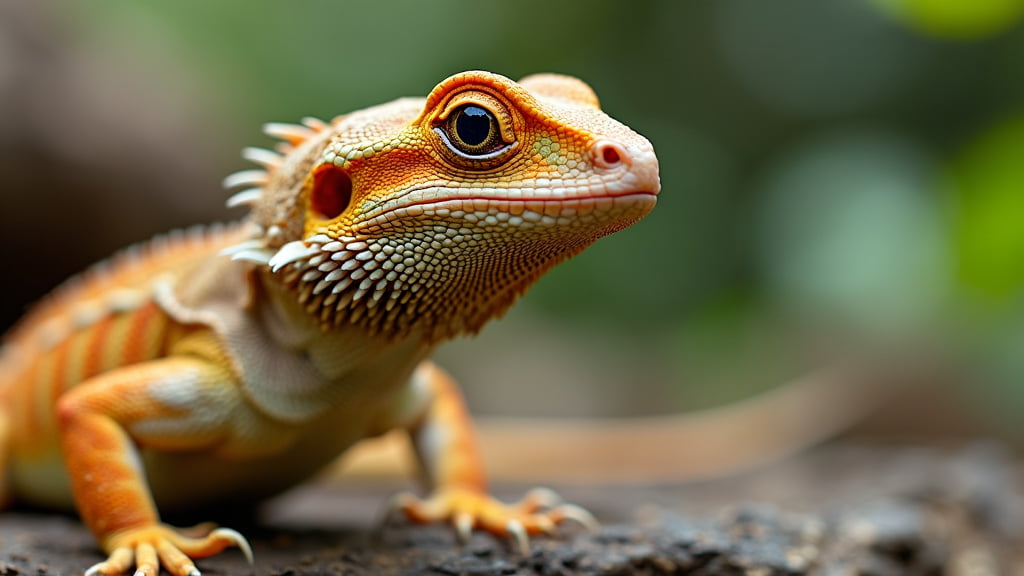Did you know that bearded dragons can eat a lot of different foods? That’s right! They munch on crunchy bugs and snack on fresh veggies. But what about earthworms? Can bearded dragons safely eat them? Let’s dive in and find out!
Understanding Bearded Dragons’ Natural Diet
Origins and Natural Habitat
Bearded dragons come from the dry, sunny places in Australia. They live in deserts, woodlands, and scrublands. They like to bask on warm rocks and hunt for food in the wild.
Typical Diet in the Wild
So, what does a wild bearded dragon usually eat? In their natural home, they aren’t too picky. They eat insects, small critters, fruits, and different plants. This mix helps them get plenty of protein, vitamins, and minerals.
Common Dietary Practices for Pet Bearded Dragons
General Dietary Needs
Pet bearded dragons need a diet similar to their wild cousins but with more control. They need protein, calcium, vitamins, and minerals to stay healthy. A mix of insects (like crickets and mealworms), fresh greens, and sometimes fruits is common.
But what about earthworms? Let’s find out.
Earthworms as a Food Source
Nutritional Value of Earthworms
Earthworms can be good for your bearded dragon’s diet. They have a lot of protein and not much fat. Earthworms also have important amino acids for your dragon’s growth and health.
Comparison with Other Common Foods
Compared to other foods like crickets and mealworms, earthworms have their own benefits. Crickets have a lot of protein, and mealworms have healthy fats. Earthworms have a nice mix of both. But it’s important to have variety in the diet, so earthworms should be just one part of it.
Safety Considerations
Potential Risks of Feeding Earthworms
While earthworms can be healthy, they can also pose risks. They might carry parasites or be exposed to pesticides, which can be harmful to your bearded dragon. Earthworms can also have bacteria that might upset your dragon’s stomach.
Remember: Safety first!
Safe Sourcing of Earthworms
If you want to feed earthworms to your dragon, it’s important to get them from safe places. Buy earthworms from reputable pet stores or organic bait shops. Avoid digging them up from your backyard since you don’t know what they might have been exposed to.
Trustworthy stores will make sure their worms are free from harmful chemicals and parasites, making them safer for your pet.
Feeding Techniques and Frequency
How to Introduce Earthworms to Their Diet
Introducing earthworms to your bearded dragon’s diet can be fun. Start with small amounts. Here’s a step-by-step guide:
- Step 1: Wash the earthworms thoroughly to remove any dirt.
- Step 2: Cut them into smaller pieces if they’re too big for your dragon.
- Step 3: Use feeding tongs to offer the pieces. This way, you won’t get accidentally bitten!
- Step 4: Watch your dragon’s reaction and make sure they like their new snack.
Soon, your dragon might become a fan of these wriggly treats.
Recommended Portion Sizes and Frequency
How often should you feed earthworms to your dragon? Adult dragons can have earthworms once a week. Younger dragons, which grow faster, might enjoy them more often. Just make sure earthworms are part of a balanced diet with other foods too.
Monitoring Health and Dietary Balance
Observing Behavioural Changes
As you introduce earthworms, watch for any changes in your dragon. Increased activity is a good sign. But watch out for digestive issues or laziness, which might mean earthworms aren’t right for them.
Ensuring a Balanced Diet
While earthworms can be tasty, they shouldn’t be the only food. A varied diet is important. Mix in different insects, greens, and an occasional fruit to make sure your dragon gets all the nutrients it needs.
Remember, it’s all about balance. Eating the same thing every day wouldn’t be fun, right?
Conclusion
Recap: Earthworms can be a safe and nutritious addition to your bearded dragon’s diet, as long as they’re from a reliable source and fed in moderation. They offer a good protein source to go with other foods your dragon enjoys.
Final Thoughts: Keeping a balanced diet, sourcing safety, and consulting with your vet are key to keeping your dragon happy and healthy. Don’t be afraid to mix up different food options to keep mealtime exciting for your pet.
Call to Action: Have you tried feeding earthworms to your bearded dragon? Share your experiences in the comments below! And remember, if in doubt, always ask your vet for advice.
Additional Resources
Taking care of an exotic pet can be a rewarding adventure. We at Dug’s Bugs are here to help you every step of the way. Happy feeding and may your bearded dragons thrive!
Cheers,
The Dug’s Bugs Team




